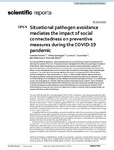2023-02-10Zeitschriftenartikel
Situational pathogen avoidance mediates the impact of social connectedness on preventive measures during the COVID-19 pandemic
Taubert, Frederike
Sprengholz, Philipp
Korn, Lars
Eitze, Sarah
Wiedermann, Marc
Betsch, Cornelia
During the COVID-19 pandemic, physical distancing was one of the more important behaviours for reducing the spread of the virus. The present study investigated the influence on pathogen avoidance of familiarity with other people at private gatherings. Based on the social identity model of risk taking and the theory of the behavioural immune system, we assumed that greater familiarity with others would make people feel more connected with one another and decrease situational pathogen avoidance. This could result in lower perceptions of the risk of contracting COVID-19 and fewer protective behaviours. Two experiments (n1 = 1022, n2 = 994) showed that the negative influence of greater familiarity on the perceived risk of infection and protective behaviour is explained by an increased feeling of connectedness and less feeling of situational pathogen avoidance. In an additional survey, the participants (n = 23,023) rated the quality of their past social contacts. The correlational analyses showed that the familiarity of the other person was more important in explaining variance in protective behaviours than attitudes toward those behaviours or the pandemic situation itself. Understanding the process that result in an explosive increase in infection after social gatherings can improve infection control in the future.

